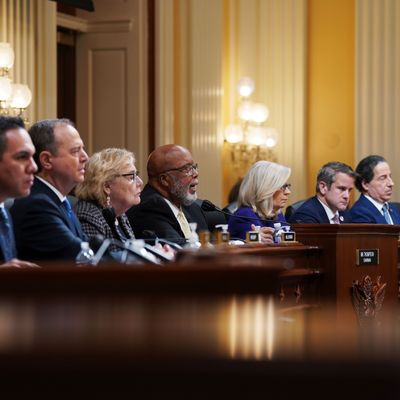
The tenth and final public hearing of the House select committee on January 6 didn’t break much new ground or provide any sensational new revelations besides confirming reports that it would refer Donald Trump to the Justice Department for criminal prosecution. Depending on what does indeed happen to the accused, the legacy of the committee, and its skillful leadership by Bennie Thompson and Liz Cheney, may well be found in the political if not legal consequences of its findings. In combination with the unsatisfying midterm elections for Republicans and Trump’s partial responsibility for them, the accumulated “Trump fatigue,” and the shadow of the jailhouse that now looms over the 45th president, it’s increasingly possible his accumulated problems will convince his party to look elsewhere for a 2024 presidential nominee.
Here are some final takeaways:
The hearings probably didn’t affect the midterms but might very much affect the next election.
There isn’t much evidence that the committee’s more explosive findings or their skillful dissemination in the hearings had any tangible effect on this year’s elections (as it was widely assumed they were designed to). The findings weren’t discussed much by either Democratic or Republican candidates, though it’s unlikely that threats to democracy would have become a major campaign theme without the committee’s work. Yes, to the extent that Republican underperformance in the midterms may have been partially attributable to swing voters unhappy with MAGA extremism, the committee’s findings may have also contributed materially to that impression. But the committee seemed to be more concerned with what might happen after the midterms to Trump and his criminal associates.
Testimony secured by the committee from an extraordinary number of previously loyal Trump subordinates attesting to the consciously unlawful and deceitful nature of his conduct over many months provides a bright-line guide for Republicans to dump Trump as a future presidential candidate. That will certainly be useful to potential rivals.
Indeed, the desire to decisively rule out a Trump comeback probably explains the remarkable consolidation of support forming in favor of Florida governor Ron DeSantis if he chooses to challenge a restoration. Ultimately, Trump’s fate will be determined by his own bad conduct and the vagaries of the legal system, but the committee may have assembled his baggage into an especially heavy burden.
The committee’s work may have made a repetition of January 6 all but impossible.
The committee could have simply focused on the assault on the Capitol instead of exploring so thoroughly the Trump conspiracy, from the deliberate undermining of the legitimacy of voting by mail to the election-night declaration of victory to the efforts to meddle with vote-counting to the pursuit of state-legislative interventions to the appointment of fake electors to the pressure placed on Mike Pence and Republican members of Congress to reverse the outcome. All this documentation will make it much easier to identify a presidential-election conspiracy should one by launched by Trump or anyone else in the future. The evidence is simply too massive to ignore as “partisan” and will have an effect on perceptions of what happened in 2020 forever.
More specifically, it’s increasingly likely that legislation to fix ancient problems with the Electoral Count Act of 1887 will be enacted by year’s end with bipartisan support. By so clearly identifying the flaws in the process to implement election results, the committee made that important reform possible.
It makes future investigations by House Republicans look petty by comparison.
In just over two weeks, Republicans will take control of the House (though very narrowly), and it’s almost certain that future Speaker Kevin McCarthy (or some alternative Speaker backed by Freedom Caucus extremists) will implement an aggressive agenda of investigations (they really have no power to advance legislation) almost immediately. These are expected to include a massive focus on the contents of Hunter Biden’s laptop, attacks on the Biden administration’s handling of border security, and eventually some talk of impeaching the president himself or his Cabinet members.
While the committee’s referrals to the House Ethics Committee of Republican members who would not comply with subpoenas will go nowhere, there will be a clear contract between the gravity of the events pursued by House Democrats and the rabbit holes the GOP intends to explore.
This was the final round of the battle between House Democrats and Trump.
It’s sometimes difficult to remember that the committee’s investigation concludes a four-year battle between House Democrats and Trump that included two impeachments and now criminal referrals. The impeachments obviously ended with Republican-driven acquittals in the Senate. The committee’s referrals may not lead to prosecutions, and even if they do, convictions are far from a foregone conclusion. But the case against the scofflaw president and his deliberate and dangerous challenge to the Constitution has reached a high point just as Democrats give up the power to conduct it further with the chamber changing hands next month. Pursuing Trump cost the two Republicans on the committee their House seats (Adam Kinzinger’s by intimidation, Liz Cheney’s by a primary purge), but it very clearly mattered to both of them to save the honor of their party, even if that party disowned them. But the committee report — and its use of enduring images that ought to shame anyone who ever supported Trump — will represent a solid legacy to all who participated.






























